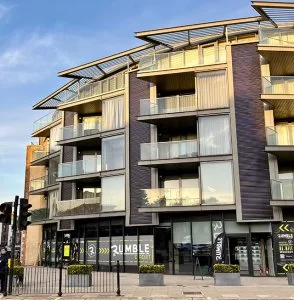Security of Tenure

Contact
Table of Contents
Security of tenure gives business tenants the right to stay in their property after the lease ends and request a renewal on similar terms. This article explores how security of tenure works, its benefits for businesses, the legal process involved and what happens when disputes arise. Whether you’re a landlord or tenant, understanding security of tenure is key to making informed decisions about your commercial lease.
What is security of tenure?
Security of tenure is a statutory right granted by the Landlord and Tenant Act 1954. It gives commercial tenants:
- The right to remain in occupation of the premises after the contractual term of lease comes to an end, and
- The right to a new lease on similar terms to the previous one – unless the landlord has valid grounds to oppose the grant of a new lease.
Security of tenure provides stability for business tenants. It allows them to establish a long-term base of operations and focus on business growth without the uncertainty of potential eviction at the end of their lease term.
How is security of tenure granted?
Security of tenure applies automatically to qualifying business tenancies, which generally means any business tenancy longer than 6 months.
However, the parties can agree to “contract out” of these provisions if desired.
Tenants who do not regard the property as critical to their long-term business plans may be willing to waive their security of tenure rights in return for a beneficial rent or other concessions.
How do I know if my lease has security of tenure?
To contract out of security of tenure, both parties must follow a strict procedure:
- The landlord must serve a warning notice on the tenant, notifying the tenant that it is giving up its rights to security of tenure.
- The tenant must sign a statutory declaration or simple declaration stating that it accepts the consequences of giving up these rights.
- The type of declaration depends on whether the landlord served notice more than 14 days before lease completion.
- The lease must also include a reference to the contracting out, so it should be obvious when reading the lease whether security of tenure is applicable.
Whether a lease has security of tenure makes a substantial difference to the type of commercial decisions you can make at lease end. If in doubt, seek legal advice.
What happens when the term of a protected lease ends?
For leases “inside the Act”—meaning those with security of tenure—the lease does not end on the expiry date. Instead, the tenant enters a period of “holding over.” This means they carry on paying rent and observing the lease covenants in exactly the same way as before, until somebody does something to end or renew the lease.
The landlord can get things moving by serving a section 25 notice on the tenant. The notice says one of two things:
- The landlord opposes the grant of a renewal lease, in which case the landlord must prove one of seven statutory grounds for ending the tenancy, or
- The landlord does not oppose the grant of a renewal lease, in which case the notice will propose terms for the new lease (rent, length of term etc).
The tenant can also take the initiative and serve a section 26 notice on the landlord requesting to renew their tenancy. The notices are designed to act as a trigger for the parties to come together and start negotiating terms for the new lease.
The consequences of getting these notices wrong can be very steep indeed, especially for landlords who may lose the ability to recover possession of their property for many years. Seeking professional legal advice is highly recommended to ensure compliance with the Landlord and Tenant Act 1954.
Can the tenant vacate the premises at the end of the term?
Yes, the tenant can vacate the premises if they choose. They can either:
- Vacate the property on the expiration date without providing any notice; or
- Serve a section 27 notice three months’ in advance.
Serving notice is preferable as it prevents the tenancy from continuing. Vacating the property doesn’t just mean moving out—it means delivering full vacant possession. If the tenant leaves a few fittings behind, that may be enough to keep the lease holding over.
Tenants wanting to hand the premises back should speak to an experienced commercial property solicitor for advice. Our landlord and tenant team has years of experience in lease terminations. We can end the lease properly so you don’t get stuck with a lease you thought you’d left behind.
When are court proceedings needed?
When landlords and tenants disagree, it is often because they cannot agree the terms of the renewal lease.
Generally, the terms should be the same as the existing lease, save for rent which will be assessed at market rate. Changes can and often do occur, however, not least because lease conditions that were acceptable 10 or 15 years ago, when the current lease was granted, may not be acceptable to one or both parties today.
Most lease renewal disputes can be resolved by negotiation. However, sometimes the parties will need a third party to help direct the terms of a new tenancy.
One option is PACT (Professional Arbitration on Court Terms), where an arbitrator or independent expert can resolve disputes on matters such as:
- Term of the new lease
- Rent and rent review
- Service charge disputes
- Repair clauses
- Assignment and subletting
- Break clauses
- Other terms of the new tenancy
PACT offers a viable alternative to litigation and can save both time and costs. The parties can still go to court if they prefer, presenting evidence to a judge who then makes a decision.
Can the landlord evict a tenant with security of tenure?
The landlord can only oppose the tenant’s request for a new tenancy on one of seven grounds set out in the 1954 Act.
Some of the grounds relate to the tenant’s breach of lease (e.g. persistently late payment of rent; failure to comply with repair obligations), and others allow the landlord to oppose renewal on ‘no-fault’ grounds if, for example, it wants to redevelop the property.
If the tenant objects to the landlord’s grounds, there will need to be a full hearing in court. The tenant may be entitled to compensation in certain circumstances.
There is a strict legal process for opposing a lease renewal. Our page on Section 25 notices looks at the steps involved in more detail.
How we can help with security of tenure disputes
Security of tenure is a tricky area of law. It requires landlords and tenants to think carefully about their goals before the lease is granted, and again when it is time to renew. You will need the support of specialist commercial property litigators and transactional commercial lease lawyers to guide you through the process.
Our contentious and non-contentious landlord and tenant teams can support you with all aspects of security of tenure law. We can help you with:
- Lease strategy – whether the lease should be included or excluded to protect your best interests.
- Security of tenure advice – whether the lease has been “contracted out” correctly and the implications for your business.
- Notices – drafting, serving and responding to s.25, s.26 and s.27 notices to start renewal or termination proceedings.
- Dispute resolution – working to find an equitable solution, including alternative dispute resolutions and court proceedings where necessary.
- New leases- we act for both landlords and tenants where renewal leases are being negotiated under the Landlord and Tenant Act 1954.
To speak to a member of our team, contact us by:
- Filling in our online enquiry form; or
- Calling us on 020 7485 8811
Share this article
Contact us about Section 25 Notices
Call us 020 7485 8811
Email us Send us an email and we’ll get back to you
Related InsightsVIEW ALL
- 5.3.2025
TOLATA Claim Settled At Mediation
Complex TOLATA claim settled after an extensive mediation We recently settled at mediation, a complex TOLATA case involving a dispute...
Read more - 4.12.2024
Section 25 Notices
A Section 25 notice plays an important role in commercial leases, letting landlords and tenants know what’s next when a...
Read more - 4.12.2024
Section 21 Notices
Guide to section 21 no-fault evictions Evicting tenants is never easy but under the no-fault eviction process, it should be less...
Read more - 18.11.2024
Rent Repayment Orders
Guidance for Rent Repayment Orders (RROs) for Landlords in the UK Rent Repayment Orders (RROs) are legal orders requiring a...
Read more - 13.11.2024
Evicting a Tenant
How to evict a tenant: Guidance for landlords Evicting tenants is rarely straight forward. It is a challenging and complex...
Read more - 16.10.2024
Managing Litigants: Court Powers and Defendant Options
How can the court control a litigant? Most people wish to live out their lives without the need to face...
Read more - 15.10.2024
How do you determine a boundary?
Whether the boundary dispute relates to a rear garden boundary or whether it relates to a driveway, the issue of...
Read more - 14.10.2024
Can You Challenge a Restrictive Covenant?
Challenging a restrictive covenant! Is it obsolete? It is well known that section 84(1) of the Law of Property Act 1925 allows...
Read more - 22.3.2024
The Renters Reform Bill
A Review of the Renters Reform Bill The 2019 Conservative Manifesto made a commitment to end “no fault evictions”. This has...
Read more - 22.3.2024
Client successful in TOLATA proceedings
The case related to proceedings under the Trusts of Land and Appointment of Trustees Act 1996 (“TOLATA”) in respect of joint...
Read more - 23.1.2024
Freehold Service Charge Disputes
Service Charges & the Leasehold and Freehold Reform Bill The Leasehold and Freehold Reform Bill was introduced to Parliament on 27...
Read more - 23.1.2024
Know your Rights (of Way)
If you have a question or concern over a right of way on your property, it is important to seek...
Read more - 23.1.2024
Party Wall Etc Act 1996 v Common Law
The case of Power & Kyson & Shah [2023] EWICA Civ 239 The case of Power & Kyson & Shah [2023] EWICA Civ 239...
Read more - 27.10.2023
The Building Safety Act 2022
Introduction to the Building Safety Act 2022 This much awaited Building Safety Act 2022 was introduced into Parliament on 5th May 2021 as...
Read more - 22.8.2023
Reasonableness of Service Charges
Reasonableness of Service charges under the Landlord and Tenant Act 1985 It is well known that the relevant costs that a...
Read more - 11.5.2023
Overlooking Nuisance Claims
The Supreme Court’s Ruling on Overlooking as Private Nuisance In the case Fearn v Tate (2023) UKSC 4, the UK Supreme...
Read more - 5.2.2023
Japanese Knotweed: Knot in my backyard again!
Huge legal bill after selling home with Japanese knotweed Many will have read the recent case in which a furniture...
Read more - 9.6.2022
TOLATA Claims
What is a TOLATA claim? A TOLATA claim is a legal process under the Trusts of Land and Appointment of...
Read more - 8.6.2022
Right to Light Explained
What is the Right to Light? The right to light is a type of ‘easement’ – a legal right giving property...
Read more - 8.6.2022
The Dangers of Rent-to-Rent
What is Rent-to-Rent? Rent-to-Rent refers to the practice of landlords letting a whole property to a tenant (usually a limited...
Read more - 5.10.2021
Buying a Property with a Party Wall Agreement
Introduction to buying a house with a party wall agreement Buying a property can already be stressful, but finding out...
Read more - 10.8.2021
Beneficial Interest in Property
What does beneficial interest in property mean? A beneficial interest in property gives someone the right to share the benefits...
Read more - 26.6.2021
The Risks Of Buying Properties Off Plan!
Buying Property Off Plan The Daily Mail reported that 300 families a week have to move into shoddy newly built homes....
Read more - 11.10.2019
End to No Fault Evictions
Everything you need to know about section 21 reform The government is planning to overhaul renter’s rights in the UK,...
Read more



























